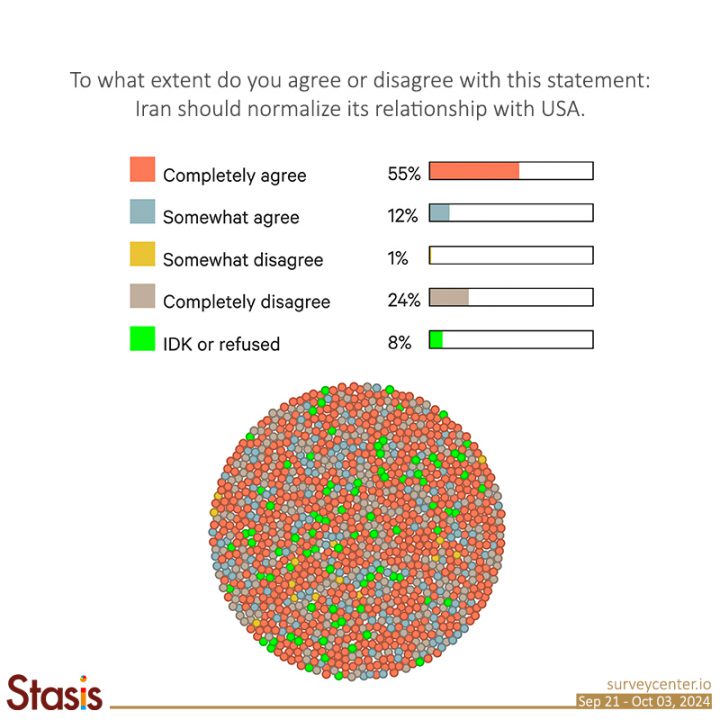
Iranian Opinion on Foreign Policy, Contradiction between Diplomacy and Military Action
Iranians overwhelmingly blame the country’s economic problems on state foreign policy. However, Iranians are invested in the idea of military presence in the Middle East. Iranians are also in favor of normalizing a diplomatic relationship with the USA and support a nuclear deal.
These findings are based on a public opinion poll carried out among 1,189 Iranians aged 18 or older living in Iran between Sept. 21 and Oct. 3, 2024. An interactive visualization of the results can be found here.
Although Masoud Pezeshkian was elected president just one month prior to this survey’s execution, only 39 percent of respondents approved of his job as president while 35 percent disapproved.
Iranians overwhelmingly blame the country’s foreign policy for the economic problems of ordinary citizens.
Seventy-eight percent of Iranians say Iran’s foreign policy is very much or to an extent a cause of the economic and social problems facing the country. These results are unchanged across demographic groups regardless of the respondents’ age, gender, location, or educational level. Just a slim part of the population, 13 percent, disagrees with this view.
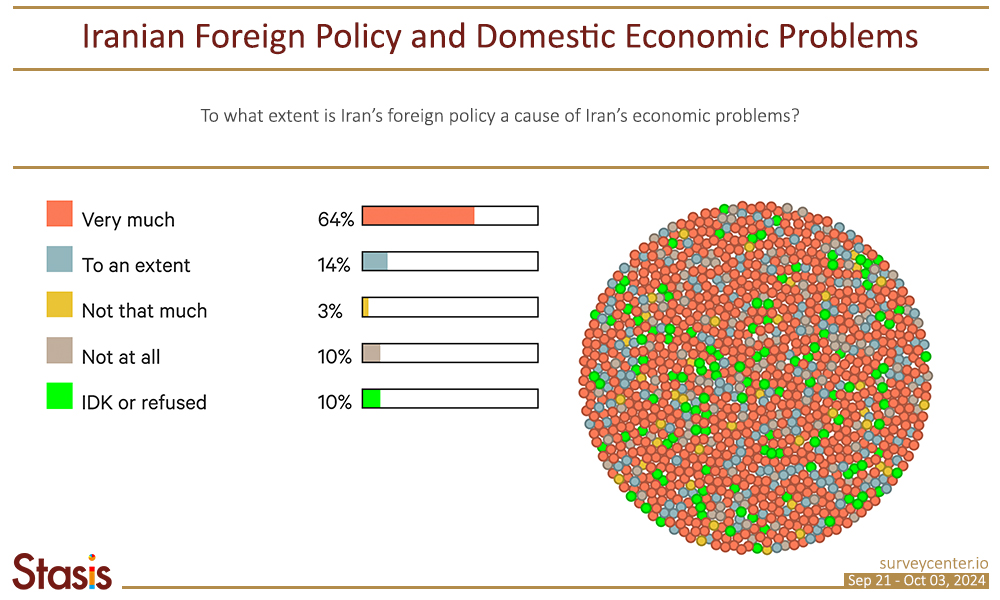
Moreover, 63 percent of the population express their overwhelming dissatisfaction with the effects of Iranian foreign policy on domestic life. When asked “How much do you think Iran’s foreign policy today advances the well-being of ordinary citizens like you?” a striking 59 percent answered in the strongest terms: “not at all.”
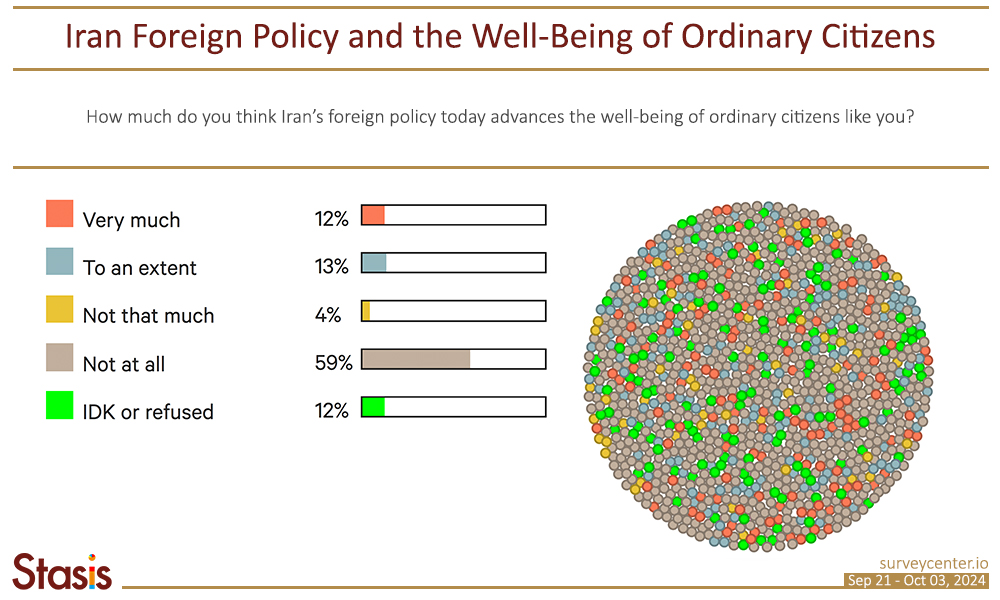
Plurality of Iranians believe Iranian foreign policy is contributing to the tensions in the Middle East
Forty-three percent of survey respondents believe Iran’s foreign policy is contributing to the tensions in the Middle East as opposed to 18 percent who hold an opposite view. Another 21 percent of respondents say Iran’s foreign policy makes no difference with respect to tensions in the region.
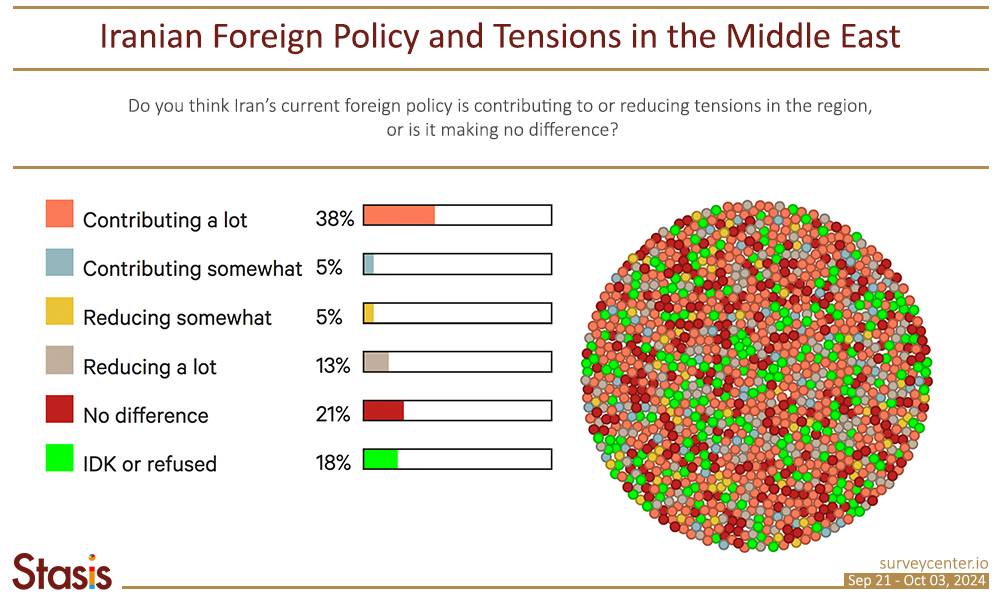
Iranians support a nuclear deal and engagement with the West
The majority of respondents support the idea of making an agreement with Western powers regarding Iran’s nuclear activities (61 percent). Only 20 percent of Iranians believe Iran should not make an agreement with Western countries. A considerable 19 percent answered that they did not know about this topic or preferred not to respond.
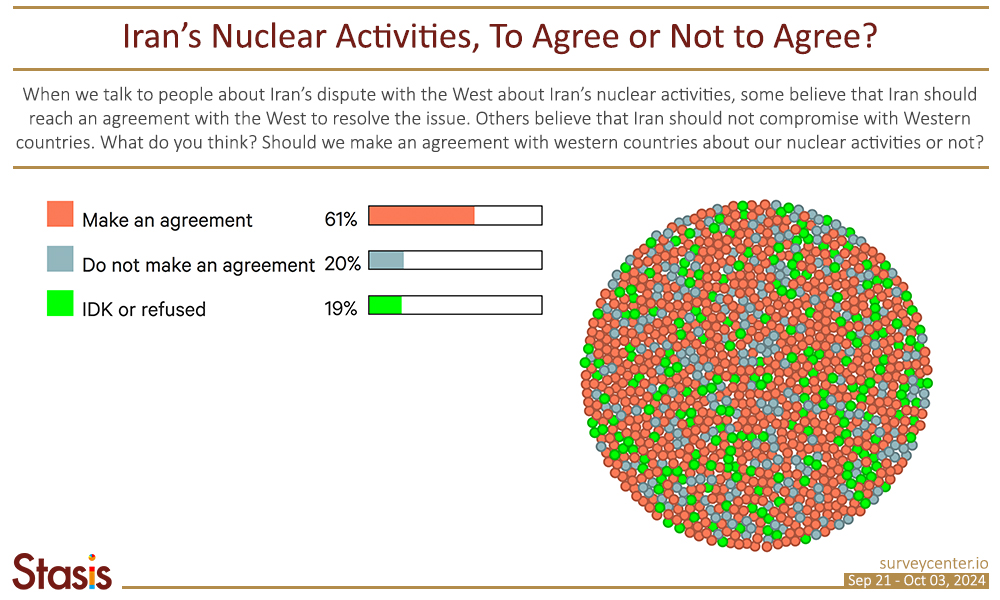
Almost 11 years ago, an interim agreement between Iran and the West on Iran’s nuclear program was signed (November 24, 2013). At that time IPOS, a survey company formerly managed by Arash Ghafouri, the pollster of this survey, posed this same question. That November 2013 survey found that 65 percent of Iranians supported an agreement, 11 percent opposed, and 9 percent supported an agreement contingent upon terms that would favor the Iranian national interest. Despite the range of developments on this issue over the last decade, public opinion of a nuclear agreement remains almost unchanged.
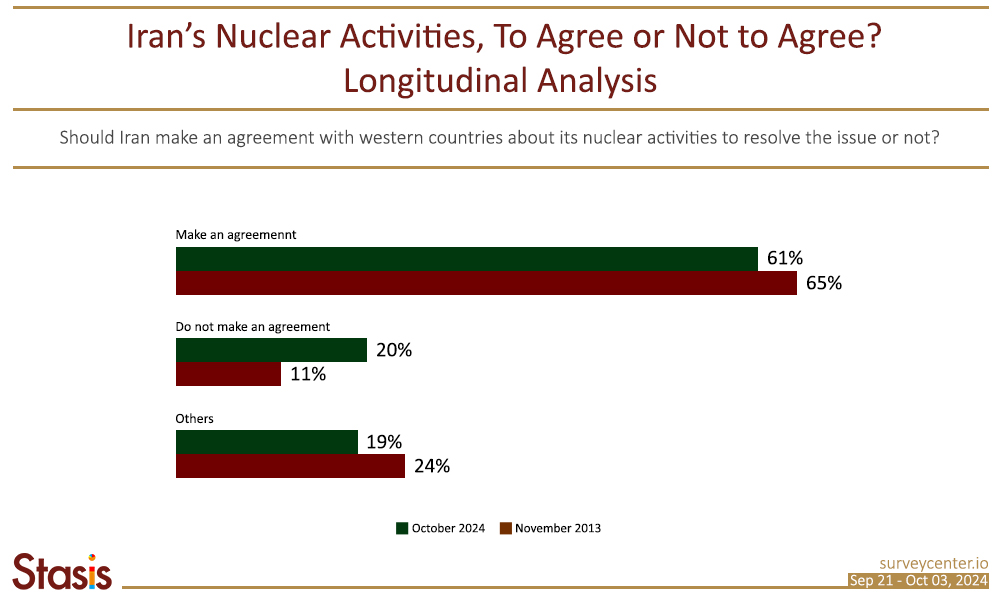
Iranians are in favor of diplomatic relationship with USA
Iranians also overwhelmingly favor the normalization of relations with the US; 67 percent of respondents supported this idea while only 25 percent opposed it. Male respondents are more likely to support diplomatic ties with the US than female respondents, with 73 and 62 percent approval, respectively.
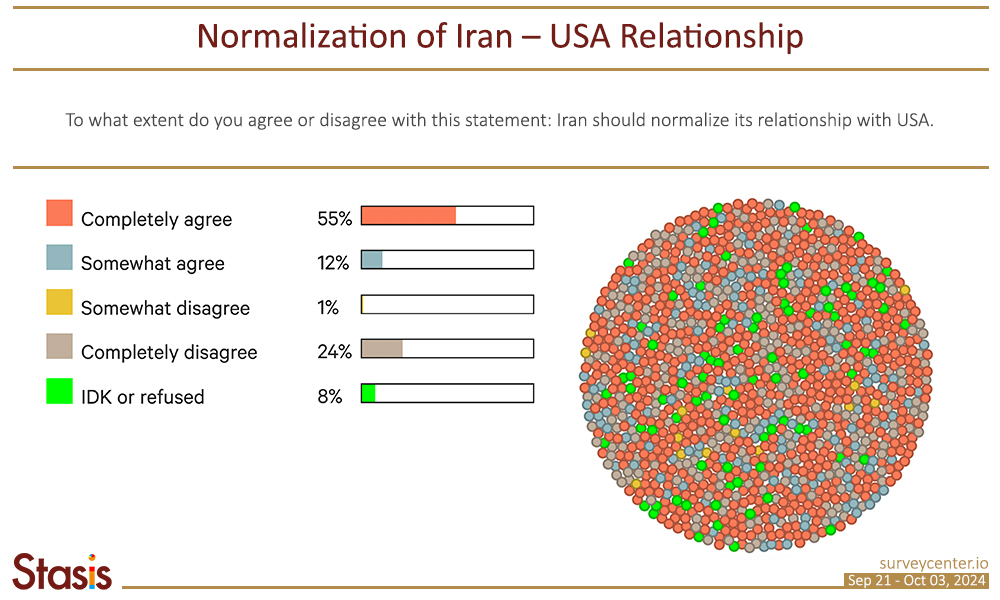
Iranians who live in urban areas strongly support of normalization (71 percent) while a smaller majority in in rural areas feel the same way (57 percent). Additionally, 73 percent of those who have college degrees prefer normalization, while those without a college degree were less likely to agree, though are still broadly in favor (65 percent).
Iranians do not support the idea of normalization of Iran – Israel relations
Although Iranians prefer the Iran-USA relationship become normalized, they do not back the normalization of an Iran – Israel relationship. Just a quarter of respondents are in favor of this idea, compared to the 67 percent who reject it.
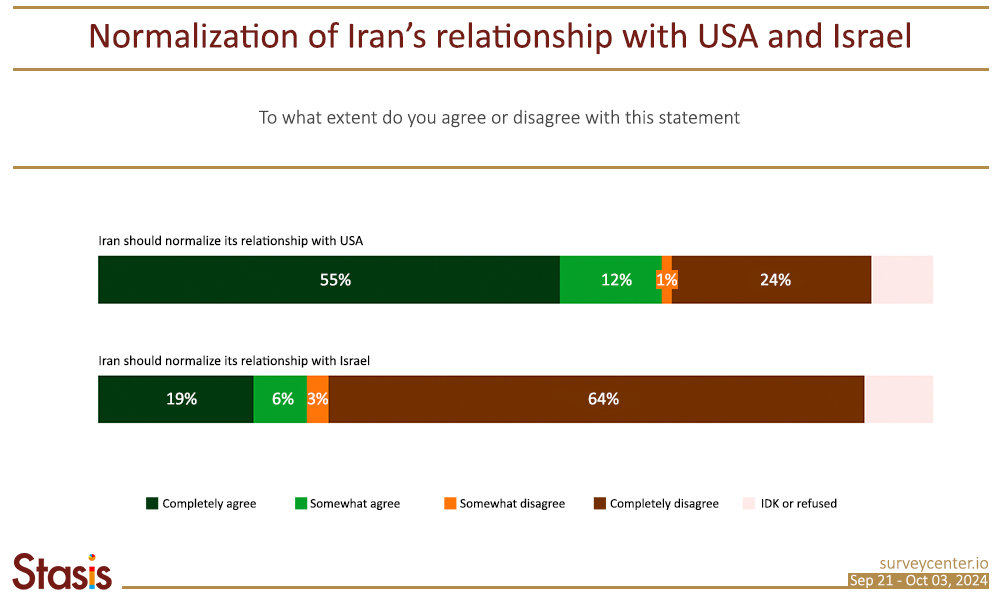
Iranians are split on their preference for relations with China and Russia vs. USA and UK
When asked if they would prefer Iran to have stronger relations with countries like China and Russia or with Western countries like the US and UK, respondents were exactly split between 34% favoring Russia and China and 34% favoring the West. Another 16% answered “both” while 16% were undecided.

Educated Iranians (those with a college degree), held a slight preference for stronger relations with Western countries (35 percent), as opposed to China and Russia (29 percent). Respondents without a college degree remained split with 36 percent favoring China and Russia, and 34 percent preferring the USA and UK. However, this group was almost twice as likely (9 percent) than their college educated peers to hold no opinion or refuse to respond.
Iran’s military support and financial assistance in the Middle East
The majority of respondents are invested in the idea of providing military support to Iran’s proxy groups, the so-called “Axis of Resistance” (Jebhe Moqavemat) in the Middle East. Sixty percent are in favor of this policy and 31 percent are against it. However, respondents are almost evenly split in their beliefs about providing financial assistance for the Axis; 49 percent say they are in favor of it compared to 45 percent who are opposed. Half of the population (exactly 50 percent) thinks Iran should have a military presence in Syria, whereas 41 percent are opposed.
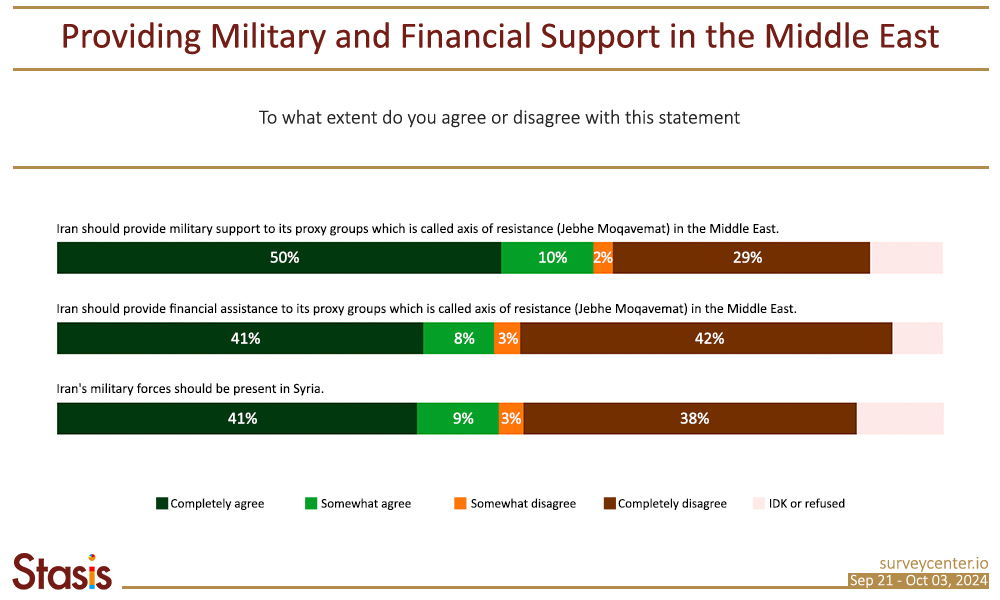
Iran’s military presence in the Middle East makes Iranians feel safer
Most Iranians believe Iran’s military presence in the Middle East makes them feel safer at home (69 percent). Similarly, 66 percent say Iran’s support for its proxy groups makes them safer at home. Those who disagree with these two statements total 25 and 28 percent, respectively.
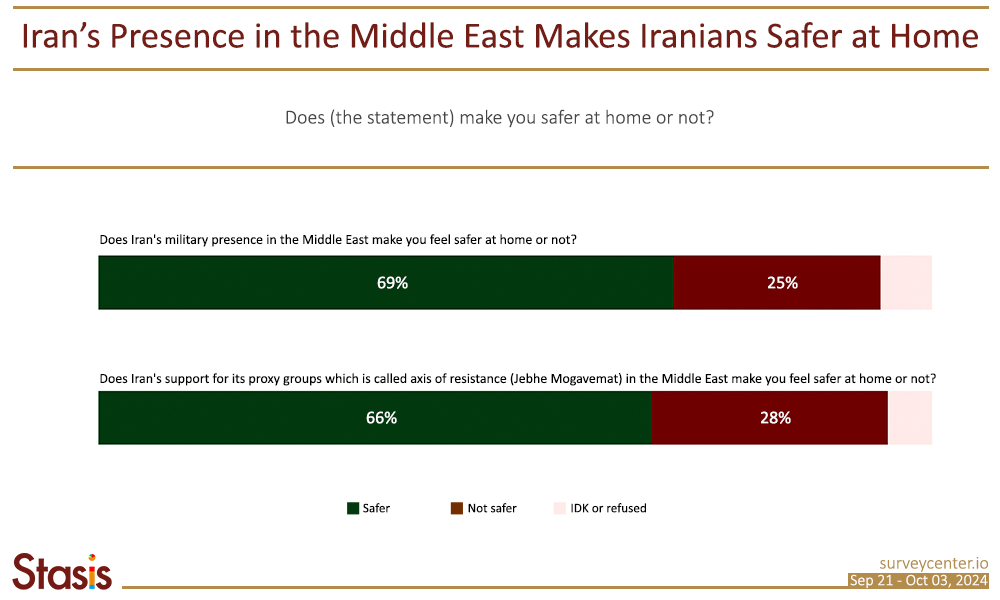
Iranian opinions on recent conflict between Iran and Israel
Most participants in this survey also believe that after recent conflicts between Iran and Israel, Iran is now in a stronger position in the Middle East (59 percent). On the other hand, 26 percent say Iran is weaker in the region after the country’s confrontation with Israel.
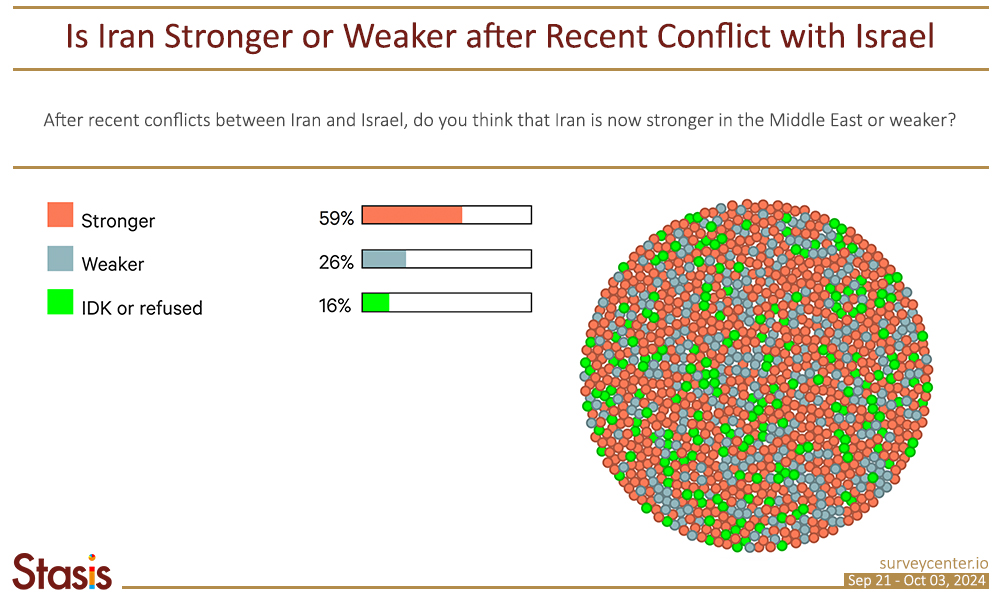
Rural respondents and respondents without a college degree are most likely to say Iran is stronger after the recent Iran – Israel conflict (68 and 62 percent, respectively). Urban and college educated Iranians also largely agree with this sentiment, though their conviction on the issue is not as strong as that of their counterparts. Fifty-six percent of Iranians residing in urban areas say Iran is stronger, as opposed to 28 percent who believe Iran is weaker; 51 percent of Iranians with a college degree consider Iran’s position in the Middle East strengthened, as opposed to the 33 percent who disagree.
President Pezeshkian job approval
Although Masoud Pezeshkian was elected president just one month prior to this survey’s execution, only 39 percent of respondents approved of his job as president while 35 percent disapproved. Iranians are still conflicted about Pezeshkian’s presidency, as more than a quarter of respondents (26 percent) reported that they did not have an opinion of the president or refused to respond. During the ten years that Stasis has measured presidential job approval, this is the largest segment of the population that has not held an opinion of the president’s performance. In the last three surveys conducted by Stasis, which evaluated President Raisi’s job approval, the share of respondents who did not have an opinion or refused to answer was less than 10 percent.
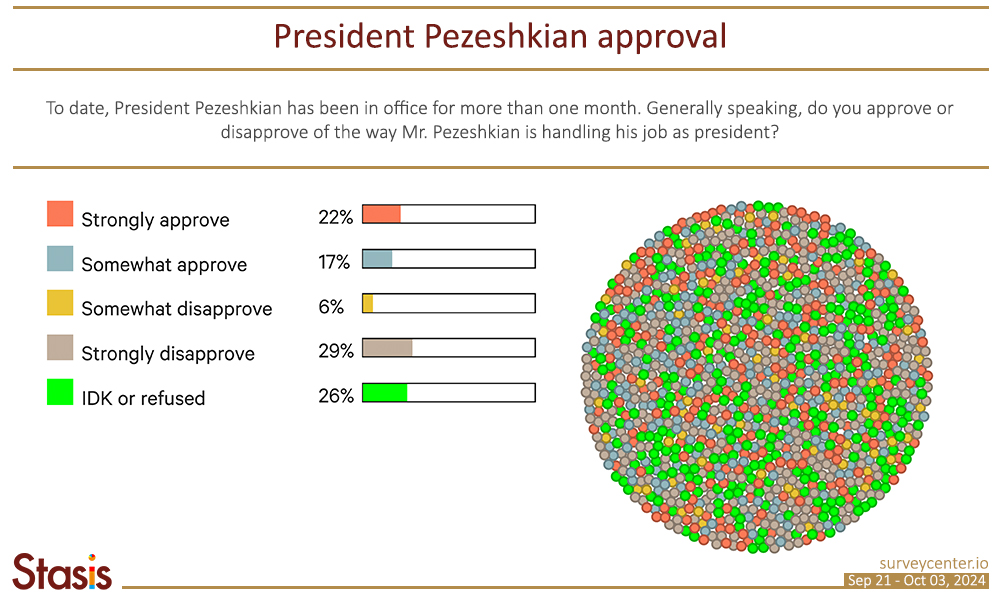
Mr. Pezeshkian’s first approval rating is better than that of President Raisi, which Stasis measured for the first time in June 2022 (ten months after he took office) and found to be 28 percent, versus a 64 percent disapproval. President Raisi’s sudden death in a helicopter accident ended his presidential term prematurely in May 2024. After his death, Raisi’s approval rating soared to an all-time high 66 percent approval (26 percent disapproval), which clearly shows the influence of posthumous sympathy.
The approval of the Iranian presidential job performance over time has been visualized in this link.
Iranians have serious concerns about the youth’s future and have limited faith in government officials
To track national sentiments on youth-related issues, the survey employs a 4-point scale, asking respondents about six statements framed with four possible responses: completely agree, somewhat agree, somewhat disagree, and completely disagree on a biannual basis. The first set of these statements were tested in February 2024.
For all six of these statements, there has not been significant change in public opinion from February to October 2024.
According to this survey, most Iranians believe that the youth are pessimistic about their future in Iran (77 percent) and would rather emigrate than remain in the country (72 percent).
Another statement posed in the survey prompted respondents to reflect on their beliefs about government interference in matters of lifestyle and political liberties pertaining to the youth population. Results indicate that 52 percent of respondents believe that officials restrict the liberty of Iranian youth by interfering in their lifestyle, compared to 41 percent who hold the opposite view. While the general population is more evenly distributed across these views, the gap between responses in the youth demographic is much larger. Only 39 percent of the youth aged 18-29 report that the government does not intervene in their liberties and lifestyles compared to 57 percent who do feel asense of interference.
Most of the population also believes that Iranian officials do not care about solving the issues that matter to the Iranian youth (76 percent). Moreover, just a slim segment of respondents say that officials listen to the needs and ideas of young people (23 percent). Additionally, just 31 percent completely or somewhat agree with the statement that “Iran’s political system welcomes Iranian youth with diverse beliefs to peruse high level government employment.” Fifty-one percent have the opposite view.
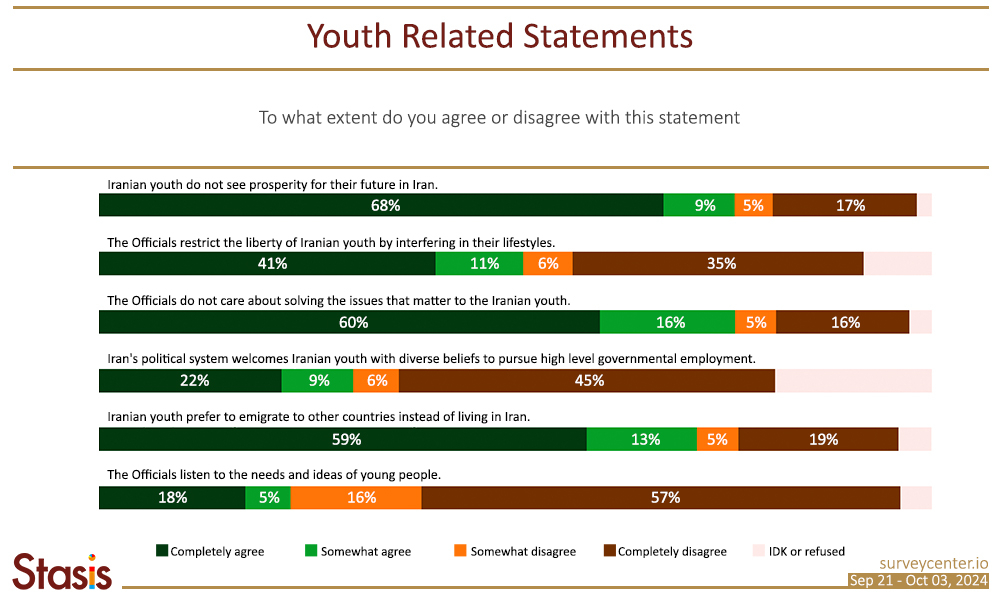
Remark
During the fieldwork for this survey Hassan Nasrullah, the leader of Lebanese Hezbollah, was killed on September 27, 2024, by an Israeli air force attack on the group’s headquarters in Beirut, along with other Hezbollah commanders and high-ranking officers of Iran’s Revolutionary Guard’s Qods Force. During this period of increased tensions, Iran’s state TV aggressively promoted arguments for retaliation and attempted to stimulate Iranian nationalism. Moreover, at the conclusion of the fieldwork period, Iran launched such a retaliatory strike against Israel (October 1, 2024).
These rapid changes in the political environment of the region could potentially affect public opinion regarding some survey questions, especially those directly related to Iran’s foreign affairs, the role of Iran’s military presence in the region, and the financial and military support of its proxies.
Generally speaking, citizens are more likely to be in line with their leaders during wartime or other periods when citizens perceive that their country is under threat of external attack. This “moment of nationalism,” encouraged by state media, has the potential to briefly impact respondents’ impressions of current events, particularly among those who do not already possess strong views of foreign policy.
The results of this poll have been interactively visualized in this link. This is an interactive platform detailing the results of every question, distinguished in a bar chart by gender, age group, location, and education.
For each question, there is also a bubble chart (consisting of many small circles), detailing the respondents’ information. Each circle represents a single respondent; clicking on any given circle will generate the complete answer set for that particular respondent. The color coding is consistent between the bubble chart and bar chart for easy comparison.
Methodology
Survey methodology explained below:
- Telephone interviews were conducted between September 21 to October 3, 2024, among 1,189 respondents aged 18 and older living in Iran. Native Farsi speakers conducted the interviews during daytime hours.
- The proportional two-stage sample includes respondents from every province. In the first stage, a selection of 12k numbers were drawn from the database, proportional to the provincial distribution. In the second stage, these numbers are assigned to the interviewers to call and store responses in the system. Provinces have been sampled based on their population.
- Out of 1,189 respondents in unweighted data, 80 percent live in urban areas and 20 percent live in rural areas. Additionally, the sample consists of 58 percent male and 42 percent female respondents. Twenty percent fall into the 18-29 age group, 69 percent in the 30-64 age group, and 11 percent in the 65 and up age group. All provinces except Tehran are represented in the sample by no more than ±2% of their population share. The province of Tehran is underrepresented by 2.3 percent in this unweighted sample.
- Results are weighted by gender, age, location (urban vs. rural areas), and adjusted for Tehran’s province based on the 2018 statistical yearbook and Iran’s Statistical Center demographic predictions for the year 2024.
- Based on the sample, the margin of sampling error is within ±2.8 percentage points at the 95% confidence level.
- The candor and reliability of respondents were appraised by the interviewers on a five-point scale (very high to very low). Those respondents who a) measured very low in both criteria or b) measured very low in one criteria and low in the other, were removed from the sample. The total number of people removed from the sample on these criteria is 54. Additionally, rates of non-applicable, don’t know/refused (DKNA) responses across the questionnaire were analyzed and 11 cases (interviews) exceeding 70% DKNA responses were revealed. Eight of these interviews had been removed by the previous criteria, then the three remaining cases were also removed.
- The response rate for this survey was 21.9 percent.
- This poll was carried out by Stasis in association with the Middle East Institute.